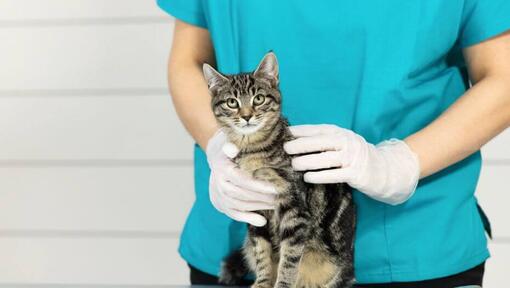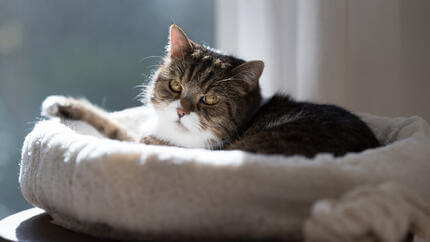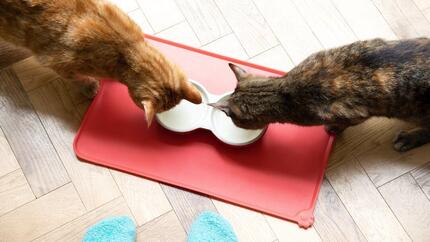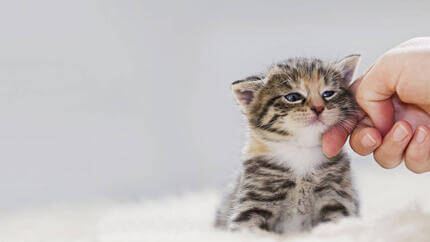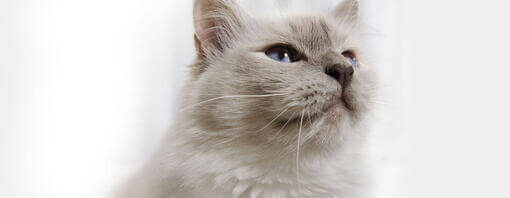
Your cat is an important part of your family, and we understand that it’s not nice to think of your fluffy companion getting older.
As felines don’t get fine lines and wrinkles like us, the signs of old age in cats aren’t always obvious. Changes in your cat are most likely to start on the inside as they approach their golden years, and they will gradually age like we do. But there are a few tell-tale signs you should be aware of. We explore them, next.
At what age is a cat considered senior?
Although cats are considered to be of old age when they reach 7 years old, some felines will be showing off their kitten-like antics well into their mature years. Because there’s no exact age when your pet changes into a senior cat, you have to look out for particular signs instead.
Signs of an old cat
If your cat is not a spring chicken anymore, it’s natural to wonder what to expect when your pet becomes elderly and whether that moment hasn’t actually arrived. Elderly cats are very similar to humans in old age and will experience changes in their physical and mental abilities as years go by. Here are some of the most common signs that your cat is now a senior:
Loss of agility
One of the first things you will notice is a lower level of energy than usual. Of course, this could be also due to a medical problem, so it’s always best to check with your vet whenever you notice big changes in your cat’s behaviour. But expect your cat to enjoy living life in the slow lane as they get closer to senior status.
Changes in their play time routine
Play time for elderly cats will likely be comprised of shorter sessions, less energetic chases and more walking around the house or climbing cat trees. Depending on your cat’s health, you may need to adjust some of the usual games and bring them down to a slower pace, but don’t think play time is over once your feline reaches the golden years. Your vet will be able to advise on a level of activity that is suitable for your pet and will keep them well-entertained no matter the age.
Different sleeping patterns
Changes in the sleeping routine can also be a sign of an old cat. Whether your cat is waking up and vocalising in the middle of the night, or on the contrary, starts enjoying a shut-eye more than usual, a cat’s sleeping habits could be the giveaway for old age.
Increased disorientation
Cats are not particularly aloof creatures. Their feline DNA keeps them in tune with their environment well into their senior years. So when all of a sudden your cat starts getting confused while doing simple tasks such as finding their food bowl or getting to their bed, this disorientation can be caused by a cognitive decline related to ageing in elderly cats. In this case as well it is recommended to discuss the unusual behaviour with the vet.
Changes in body condition and weight
Weight fluctuations can also be a sign that your cat should start getting the senior treatment. Usually their metabolism slows down and as the amount of exercise decreases with age, you can expect to see your feline frame getting larger than usual. On the other end of the spectrum, some cats might suffer weight loss due to dental problems, also common in old age. You can check your cat’s body condition at home using these simple steps and get plenty of clues about your pet’s health and weight.
Changes in behaviour
You can find many signs of an old cat in their behaviour as well. They get a bit rusty when it comes to using the litter box and the frequency of accidents increases. They might not groom themselves as thorough as before. Or might even become moodier and less tolerant of changes in their environment. Many cats become less able to cope with stress as they age, so if you want to find out more about how you can manage cat anxiety, our guide is a good start.
Common diseases for elderly cats
There are a few health problems that tend to appear later on in the life of a cat. These are also signs of old age and you should keep a close eye on their development:
- Dental disease.
- Hyperthyroidism.
- Arthritis.
- Cognitive dysfunction.
- Kidney disease.
- Eye problems.
- Decrease in hearing.
With the proper nutrition, your usual vet check-ups and a little extra tender loving care, there’s no reason why your older cat shouldn’t stay happy and healthy throughout their later years.
Our guide on caring for your senior cat will provide helpful tips to ensure that your cat is as happy and healthy as possible in their older years.
Find out how old your feline companion is in human years using the age calculator below:
My cat is
under
1
years old
year old

